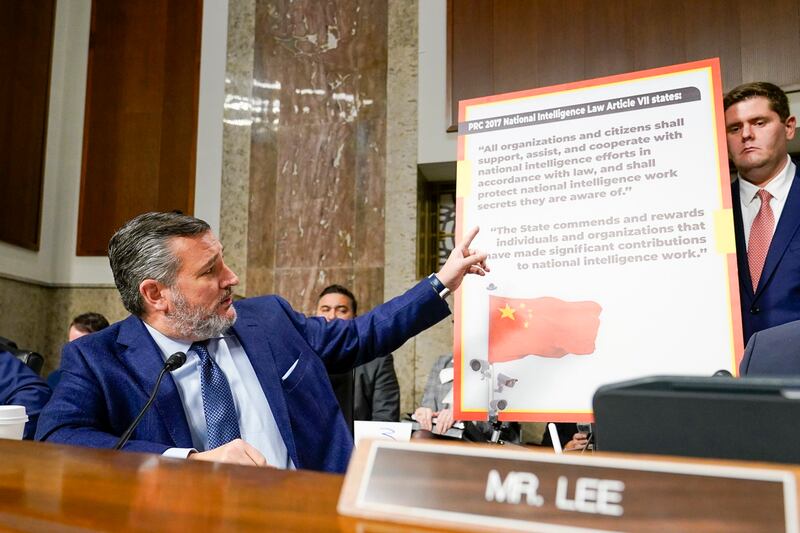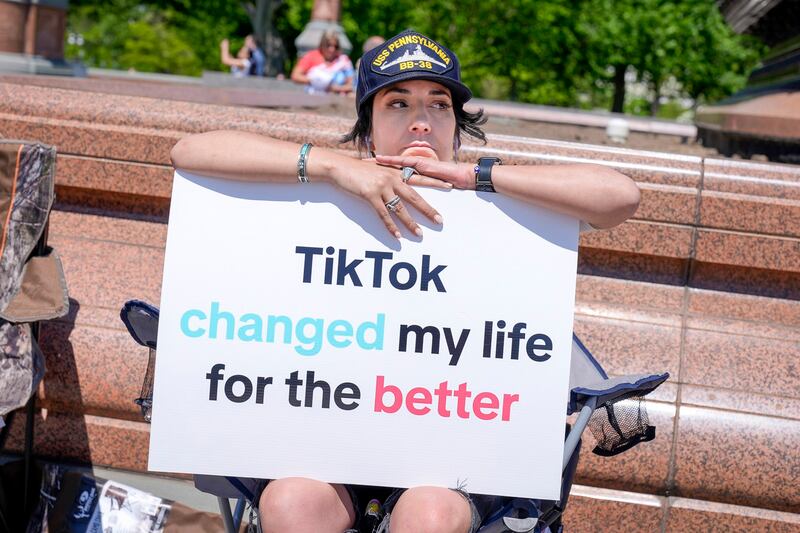China’s ByteDance must sell its ownership stake in the popular social media app TikTok within the next year or the app could be banned in the United States under legislation signed into law Wednesday.
The passage of the bill came just hours after U.S. Secretary of State Antony Blinken arrived in Shanghai for three days of meetings there and in Beijing with Chinese officials, who have slammed efforts to force ByteDance to sell TikTok as violations of international trade law.
President Joe Biden signed the bill into law as part of a legislative package that includes $61 billion of military aid for Ukraine, $26 billion for Israel and $8 billion for U.S. allies in the Indo-Pacific, including Taiwan, the democratic island claimed by China as its territory.
The bill gives ByteDance 270 days – about nine months – to divest its share in the app, with an option for the president to approve a 90-day extension if it appears that negotiations for a sale are concluding.
Lawmakers who ushered the bill through Congress argued the popular app represents a two-pronged threat to national security – both through exposing Americans’ private data to Chinese authorities, and by potentially allowing Beijing to dictate what content they watch.
But TikTok, which claims some 170 million users in the United States, says it complies with all laws and has denied links to the Chinese Communist Party. In a statement Wednesday, the company also called the bill "unconstitutional" and vowed to fight it in court.
TikTok previously overturned an August 2020 executive order signed by then-President Donald Trump that banned the app.
Bipartisan effort
The package passed the U.S. Senate in a 79-18 vote Tuesday after House Speaker Mike Johnson had over the weekend allowed separate votes on each of the package’s four constituent bills. The TikTok bill passed 360 to 58, with the Indo-Pacific aid bill passing 385 to 34.
The $61 billion in aid for Ukraine, meanwhile, passed in a 311-to-112 vote, while the $26 billion in aid for Israel passed 366 to 58.

In a speech at the White House after the passage of the legislative package Wednesday, which followed months of cross-party wrangling, Biden did not directly address the bill that could ban TikTok. But he praised lawmakers for working together on shared interests.
“It’s going to make America safer, it’s going to make the world safer and it continues America's leadership in the world,” Biden said in the brief remarks. “I’m grateful to all those in Congress – Democrats, Republicans and independents – who voted for this bill.”
Notably, the 12-month deadline for ByteDance to sell TikTok pushes the deadline for a sale passed November’s presidential election that will again pit Biden against Trump, as well as the Jan. 20 inauguration that will put one of them into the White House for a second term.
That makes the Nov. 5 election – now little more than six months away – a potential referendum on TikTok’s future, too, with Biden and Trump in recent months forking sharply on the issue of the app’s safety.
Although Trump attempted to ban TikTok while in office, he has since reversed his position to oppose any ban. On Monday, in a post to his own Truth Social platform, he slammed the recent ban bill.

"Just so everyone knows, especially the young people, Crooked Joe Biden is responsible for banning TikTok," Trump posted. "He is the one pushing it to close…. Young people, and lots of others, must remember this on November 5th, ELECTION DAY, when they vote!"
The former president has not explained the change in his position on a TikTok ban, but the reversal reportedly came after a meeting with billionaire and Republican donor Jeff Yass, whose company's 15 percent stake in ByteDance is estimated to be worth $40 billion.
Blinken in China
Blinken, meanwhile, touched down in Shanghai on Wednesday for his second visit to China in the past year. He attended a basketball game in Shanghai with U.S. Ambassador Nicholas Burns shortly after his arrival, and now has two days of meetings with business and government leaders.

Besides talks with Foreign Minister Wang Yi, Blinken is also expected to meet with President Xi Jinping while in Beijing on Friday, with Wang having met with Biden during his last trip to Washington in October.
The TikTok bill throws a spanner in the works, with Xi having personally raised his concerns about any potential ban with Biden during a phone call earlier this month, and China's foreign ministry having long opposed the efforts to force ByteDance to divest ownership.
Beijing has also long opposed the sale of TikTok by ByteDance.
At a press briefing Wednesday, Foreign Ministry spokesman Wang Wenbin referred back to past comments about U.S. legislation on TikTok in which he said proposed laws “stand on the opposite side of the principles of fair competition and international trade rules.”
At that time, he denied Chinese ownership of TikTok raised national security concerns for the United States, and instead said the bill was intended to “suppress other countries' superior companies.”
Balancing act
Aimed at further warming relations between Washington and Beijing following Biden and Xi's high-profile summit last year, Blinken's trip to China was already on somewhat tense footing, though.
In his remarks Wednesday, Biden slammed China for "providing components and know-how to boost Russia's defense production" in its war against Ukraine, mirroring remarks made by Blinken in Italy on Friday criticizing Beijing for its support of Russia's war effort.
U.S. intelligence leaders have also publicly accused Chinese hackers of targeting key infrastructure in America at the behest of Beijing, and Biden earlier this month warned Chinese naval forces against attacking U.S.-allied Philippine vessels operating in the South China Sea.
The State Department this week then issued its annual human rights country reports, which included searing criticisms of China's genocide against the Uyghur Muslim minority in the country's west, and detailed other rights abuses being perpetrated by the Chinese government.
A spokesperson for the State Department told Radio Free Asia that Blinken would not shy away from raising human rights issues.
Blinken planned to “raise clearly and candidly our concerns on human rights, including the ongoing genocide and crimes against humanity in Xinjiang, and abuses throughout the country, including in Hong Kong and Tibet,” the official said.
In response to specific questions from RFA Tibetan about China's recent issuing a list of certain banned activities if the Dalai Lama dies, the official said that the United States is concerned about Beijing's "interference" in Tibetan Buddhist practices, including the selection of the Dalai Lama and other lamas.
And in response to an RFA question about the building of a major hydroelectric dam in a Tibetan-populated area of Sichuan province that will require the relocation of several monasteries and villages, the official called for the release of those arrested for peacefully protesting the dam project.
The United States “stands with Tibetans in preserving their unique cultural, religious, and linguistic identity,” the official said. “We encourage the PRC to meaningfully include Tibetans in the development and implementation of land management policies,” using an abbreviation for the People’s Republic of China.
Edited by Malcolm Foster.

